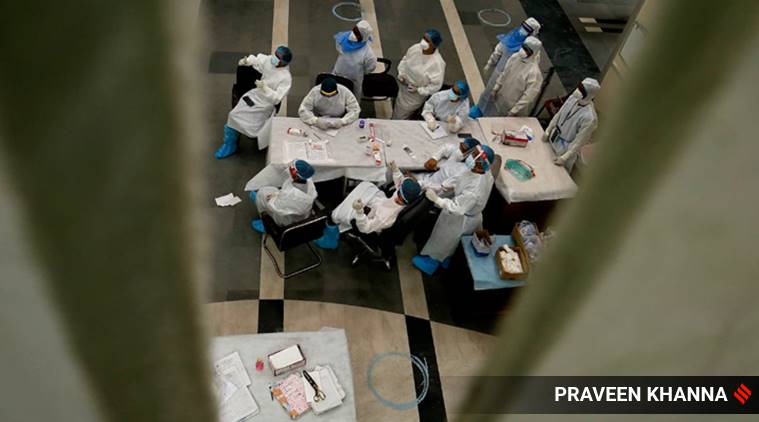 Since testing capacities were enhanced in late June, Delhi has been testing an average of around 9,500 people through RT-PCR per day.
Since testing capacities were enhanced in late June, Delhi has been testing an average of around 9,500 people through RT-PCR per day.
The drastic increase in testing in the national capital is driven largely by the Rapid Antigen Tests, with the number of people taking the RT-PCR tests dropping over the past four days as compared to the beginning of the month, data shared by the Delhi government shows.
RT-PCR tests, considered the gold standard for Covid testing, were being used exclusively in the city till June 18, which is when the faster Rapid Antigen Test kits were introduced to get more people under the testing net, especially in containment zones. While the sensitivity of RT-PCR tests is 70%, that of antigen tests is 40%.
On Thursday, Delhi saw 1,652 new cases, 58 deaths and 1,994 recoveries. The total caseload is now 1,18,645 and the death toll stands at 3,545. The total number of patients recovered/discharged is 97,693.
Since testing capacities were enhanced in late June, Delhi has been testing an average of around 9,500 people through RT-PCR per day. Starting July 13, though, this number has come down. On July 13, 3,860 RT-PCR tests were carried out. This increased to 5,650 on July 14; 6,564 on July 15; and 5,896 on July 16, but remained lower than the daily average earlier.
As reported by The Indian Express, the capital saw roughly 3 lakh antigen tests and 2 lakh RT-PCR tests over the past month.
While RT-PCR tests are prescribed by doctors for those with symptoms or exposure to a Covid patient, as per ICMR guidelines, antigen tests were brought in to test even asymptomatic people, particularly in containment zones. In antigen tests, the result can be declared on the spot in around 30 minutes. The possibility of false negatives is higher in antigen tests, and people who have Covid symptoms are suggested a confirmatory RT-PCR test.
Former head of epidemiology at ICMR, Dr Lalit Kant, told The Indian Express that as long as the retesting protocol is being followed, Delhi is on the right track. “The growing number of rapid antigen tests suggests that the city is expanding its area of testing, which is a good thing as positive cases can be identified quickly. The specificity of the rapid antigen kits is good, thought its sensitivity is not as high as that of RT-PCR tests. The protocol to retest those with symptoms using RT-PCR tests must be followed diligently to make sure false negative cases don’t slip through the cracks. Mixed use of both tests is a good strategy,” he said.
In the Delhi High Court on Thursday, the Delhi government’s Director General of Health Services submitted a report stating that of the 2,81,555 people tested in the city using antigen kits, 19,480 had tested positive. Of the remaining, 1,365 went in for follow-up RT PCR tests, of which 17.8% (243) tested positive.
“Rapid antigen detection tests have been recommended by the ICMR along with the gold-standard RT-PCR test, with advise that follow-up RT-PCR tests should be conducted in individuals with symptoms consistent with influenza-like illness that have otherwise reported negative by rapid antigen test, considering the fact that rapid antigen detection test has a moderate sensitivity and may give false negative results in some cases,” the affidavit said.
A Delhi government spokesperson said that anyone who has symptoms or has been in close contact with someone who has tested positive can go and get tested at government or private labs. “The decline is not because of anything discernible or any changes in protocol. We are following norms set by ICMR,” the spokesperson said.